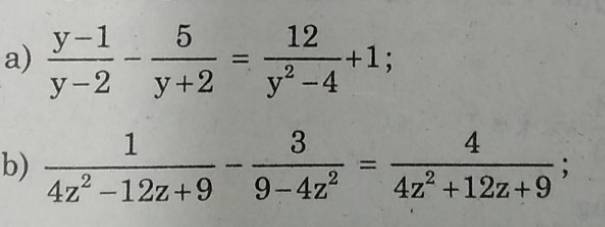Hãy nhập câu hỏi của bạn vào đây, nếu là tài khoản VIP, bạn sẽ được ưu tiên trả lời.

c: \(\Leftrightarrow x\left(x+3\right)=3+x-3\)
\(\Leftrightarrow x^2+3x-x=0\)
=>x(x+2)=0
=>x=0(loại) hoặc x=-2(nhận)
d: \(\Leftrightarrow\left(x+2\right)\left(x+3\right)+\left(x-2\right)\left(x-3\right)=2x^2+12\)
\(\Leftrightarrow2x^2+12=2x^2+12\)
=>0x=0(luôn đúng)
e: \(\Leftrightarrow x\left(x-3\right)+3\left(x-2\right)=3x-20\)
\(\Leftrightarrow x^2-6-3x+20=0\)
\(\Leftrightarrow x^2-3x+14=0\)
\(\text{Δ}=\left(-3\right)^2-4\cdot1\cdot14=9-56< 0\)
Do đó: Phương trình vô nghiệm
Gợi ý:
ĐKXĐ : Mẫu ≠ 0, từ đó bạn tự xác định
c) Tách \(^{^2x}\)- 3 thành x (x-3) -> quy đồng mẫu-> rút gọn -> tự làm
d) Tách \(^{^2x}\)-9 thành hằng đẳng thức -> như trên
e) Tách \(^{^2x}\)- 5 thành hằng đẳng thức -> như trên
f) Quy đồng mẫu, quá dễ nên không nói thêm
g) Tách \(^{^2x}\)- 1 thành hằng đẳng thức -> như trên

Bài 8:
a: Khi a=1 thì phương trình sẽ là \(\left(1-4\right)x-12x+7=0\)
=>-3x-12x+7=0
=>-15x+7=0
=>-15x=-7
hay x=7/15
b: Thay x=1 vào pt, ta được:
\(a^2-4-12+7=0\)
\(\Leftrightarrow\left(a-3\right)\left(a+3\right)=0\)
hay \(a\in\left\{3;-3\right\}\)
c: Pt suy ra là \(\left(a^2-16\right)x+7=0\)
Để phương trình đã cho luôn có một nghiệm duy nhất thì (a-4)(a+4)<>0
hay \(a\notin\left\{4;-4\right\}\)

b: ĐKXD: x<>1/5; x<>3
PT\(\Leftrightarrow\dfrac{3}{5x-1}-\dfrac{2}{x-3}=\dfrac{-4}{\left(5x-1\right)\left(x-3\right)}\)
=>3x-9-10x+2=-4
=>-7x-7=-4
=>-7x=3
=>x=-3/7
a: ĐKXĐ: x<>2/3; x<>-2/3
\(PT\Leftrightarrow\left(3x+2\right)^2-6\left(3x-2\right)=9x\)
=>9x^2+12x+4-18x+12-9x=0
=>9x^2-15x+16=0
=>\(x\in\varnothing\)
c: ĐKXĐ: x<>1/4; x<>-1/4
PT =>-3(4x+1)=2(4x-1)-6x-8
=>-12x-3=8x-2-6x-8
=>-12x-3=2x-10
=>-14x=-7
=>x=1/2
d: ĐKXĐ: x<>0; x<>2
\(\Leftrightarrow\dfrac{5-x}{4x\left(x-2\right)}+\dfrac{7}{8x}=\dfrac{x-1}{2x\left(x-2\right)}+\dfrac{1}{8\left(x-2\right)}\)
=>2(5-x)+7(x-2)=4(x-1)+x
=>10-2x+7x-14=4x-4+x
=>5x-4=5x-4
=>0x=0(luôn đung)
Vậy: S=R\{0;2}
e: DKXĐ: x<>0
PT \(\Leftrightarrow\dfrac{\left(x+1\right)\left(x^2-x+1\right)-\left(x-1\right)\left(x^2+x+1\right)}{\left(x^2+x+1\right)\left(x^2-x+1\right)}=\dfrac{3}{x\left(x^2+x+1\right)\left(x^2-x+1\right)}\)
=>x(x^3+1-x^3+1)=3
=>2x=3
=>x=3/2

\(a,\dfrac{y-1}{y-2}-\dfrac{5}{y+2}=\dfrac{12}{y^2-4}+1\left(ĐKXĐ:x\ne\pm2\right)\)
\(\Leftrightarrow\dfrac{\left(y-1\right)\left(y+2\right)}{\left(y-2\right)\left(y+2\right)}-\dfrac{5\left(y-2\right)}{\left(y-2\right)\left(y+2\right)}-\dfrac{12}{\left(y-2\right)\left(y+2\right)}-\dfrac{\left(y-2\right)\left(y+2\right)}{\left(y-2\right)\left(y+2\right)}=0\)
\(\Leftrightarrow\dfrac{y^2+y-2}{\left(y-2\right)\left(y+2\right)}-\dfrac{5y-10}{\left(y-2\right)\left(y+2\right)}-\dfrac{12}{\left(y-2\right)\left(y+2\right)}-\dfrac{y^2-4}{\left(y-2\right)\left(y+2\right)}=0\)
\(\Leftrightarrow\dfrac{y^2+y-2-5y+10-12-y^2+4}{\left(y-2\right)\left(y+2\right)}=0\)
\(\Rightarrow-4y=0\)
\(\Leftrightarrow y=0\left(tm\right)\)
\(b,\dfrac{1}{4z^2-12z+9}-\dfrac{3}{9-4z^2}=\dfrac{4}{4z^2+12z+9}\left(ĐKXĐ:z\ne\pm\dfrac{3}{2}\right)\)
\(\Leftrightarrow\dfrac{1}{\left(2z-3\right)^2}+\dfrac{3}{\left(2z-3\right)\left(2z+3\right)}-\dfrac{4}{\left(2z+3\right)^2}=0\)
\(⇔\dfrac{\left(2z+3\right)^2}{\left(2z-3\right)^2\left(2z+3\right)^2}+\dfrac{3\left(2z-3\right)\left(2z+3\right)}{\left(2z-3\right)^2\left(2z+3\right)^2}-\dfrac{4\left(2z-3\right)^2}{\left(2z-3\right)^2\left(2z+3\right)^2}=0\)
\(\Leftrightarrow\dfrac{4z^2+12z+9}{\left(2z-3\right)^2\left(2z+3\right)^2}+\dfrac{12z^2-27}{\left(2z-3\right)^2\left(2z+3\right)^2}-\dfrac{16z^2-48z+36}{\left(2z-3\right)^2\left(2z+3\right)^2}=0\)
\(\Leftrightarrow\dfrac{4z^2+12z+9+12z^2-27-16z^2+48z-36}{\left(2z-3\right)^2\left(2z+3\right)^2}=0\)
\(\Rightarrow60z-54=0\)
\(\Leftrightarrow60z=54\)
\(\Leftrightarrow z=\dfrac{9}{10}\left(tm\right).\)
\(a,\dfrac{y-1}{y-2}-\dfrac{5}{y+2}=\dfrac{12}{y^2-4}+1\left(dkxd:y\ne\pm2\right)\)
\(\Leftrightarrow\dfrac{\left(y-1\right)\left(y+2\right)-5\left(y-2\right)-12-y^2+4}{y^2-4}=0\)
\(\Leftrightarrow y^2+2y-y-2-5y+10-12-y^2+4=0\)
\(\Leftrightarrow-4y=0\)
\(\Leftrightarrow y=0\left(tmdk\right)\)
Vậy \(S=\left\{0\right\}\)
\(b,\dfrac{1}{4z^2-12z+9}-\dfrac{3}{9-4z^2}=\dfrac{4}{4z^2+12z+9}\)
\(\Leftrightarrow\dfrac{1}{\left(2z-3\right)^2}-\dfrac{3}{\left(2z-3\right)\left(2z+3\right)}=\dfrac{4}{\left(2z+3\right)^2}\left(dkxd:z\ne\pm\dfrac{3}{2}\right)\)
\(\Leftrightarrow\left(2z+3\right)^2-3\left(4z^2-9\right)-4\left(2z-3\right)^2=0\)
\(\Leftrightarrow4z^2+12z+9-12z^2+27-4\left(4z^2-12z+9\right)=0\)
\(\Leftrightarrow4z^2+12z+9-12z^2+27-16z^2+48z-36=0\)
\(\Leftrightarrow-24z^2+60z=0\)
\(\Leftrightarrow-12z\left(2z-5\right)=0\)
\(\Leftrightarrow\left[{}\begin{matrix}-12z=0\\2z-5=0\end{matrix}\right.\)
\(\Leftrightarrow\left[{}\begin{matrix}z=0\left(tmdk\right)\\z=\dfrac{5}{2}\left(tmdk\right)\end{matrix}\right.\)
Vậy \(S=\left\{0;\dfrac{5}{2}\right\}\)

để \(\left|8-x\right|=8-x< =>8-x\ge0< =>x\le8\)
\(=>8-x=x^2+x< =>x^2+2x-8=0\)
\(< =>\left(x+1\right)^2-3^2=0< =>\left(x-2\right)\left(x+4\right)=0\)
\(=>\left[{}\begin{matrix}x=2\left(TM\right)\\x=-4\left(TM\right)\end{matrix}\right.\)
*để\(\left|8-x\right|=x-8< =>8-x< 0< =>x>8\)
\(=>x-8=x^2+x< =>x^2=-8\)(vô lí)
vậy x=2 hoặc x=-4

Ta có:
(2 - 3x)(x + 8) = (3x - 2)(3 - 5x)
⇔ (2 - 3x)(x + 8) - (3x - 2)(3 - 5x) = 0
⇔ (2 - 3x)(x + 8) + (2 - 3x)(3 - 5x) = 0
⇔ (2 - 3x)(x + 8 + 3 - 5x) = 0
⇔ (2 - 3x)(11 - 4x) = 0
⇔ 2 - 3x = 0 hay 11 - 4x = 0
⇔ 2 = 3x hay 11 = 4x
⇔ x = \(\dfrac{2}{3}\) hay x = \(\dfrac{11}{4}\)
Vậy tập nghiệm của pt S = \(\left\{\dfrac{2}{3};\dfrac{11}{4}\right\}\)
<=> (2-3x ) (x+8) + (2-3x ) (3-5x)=0
<=> (2-3x ) ( x+8 + 3-5x ) =0
<=> (2-3x ) ( 11 - 4x ) = 0
=> 2-3x =0 hoặc 11-4x =0
3x = 2 4x =11
x = 2/3 x = 11/4




Điều kiện xác định :
\(\left\{{}\begin{matrix}2x-2\ne0\\x-1\ne0\end{matrix}\right.\)
\(\Leftrightarrow\left\{{}\begin{matrix}2x\ne2\\x\ne1\end{matrix}\right.\)
\(\Leftrightarrow x\ne1\)
\(\dfrac{2x+1}{2x-2}=\dfrac{2}{x-1}\)
\(\Leftrightarrow\dfrac{2x+1}{2x-2}-\dfrac{2}{x-1}=0\)
\(\Leftrightarrow\dfrac{2x+1}{2\left(x-1\right)}-\dfrac{2}{x-1}=0\)
\(\Leftrightarrow\dfrac{2x+1-2.2}{2\left(x-1\right)}=0\)
\(\Leftrightarrow2x+1-4=0\)
\(\Leftrightarrow2x-3=0\)
\(\Leftrightarrow x=\dfrac{3}{2}\left(tmdk\right)\)
Vậy \(S=\left\{\dfrac{3}{2}\right\}\)
DKXĐ: x<>1
PT =>2x+1=4
=>2x=3
=>x=3/2